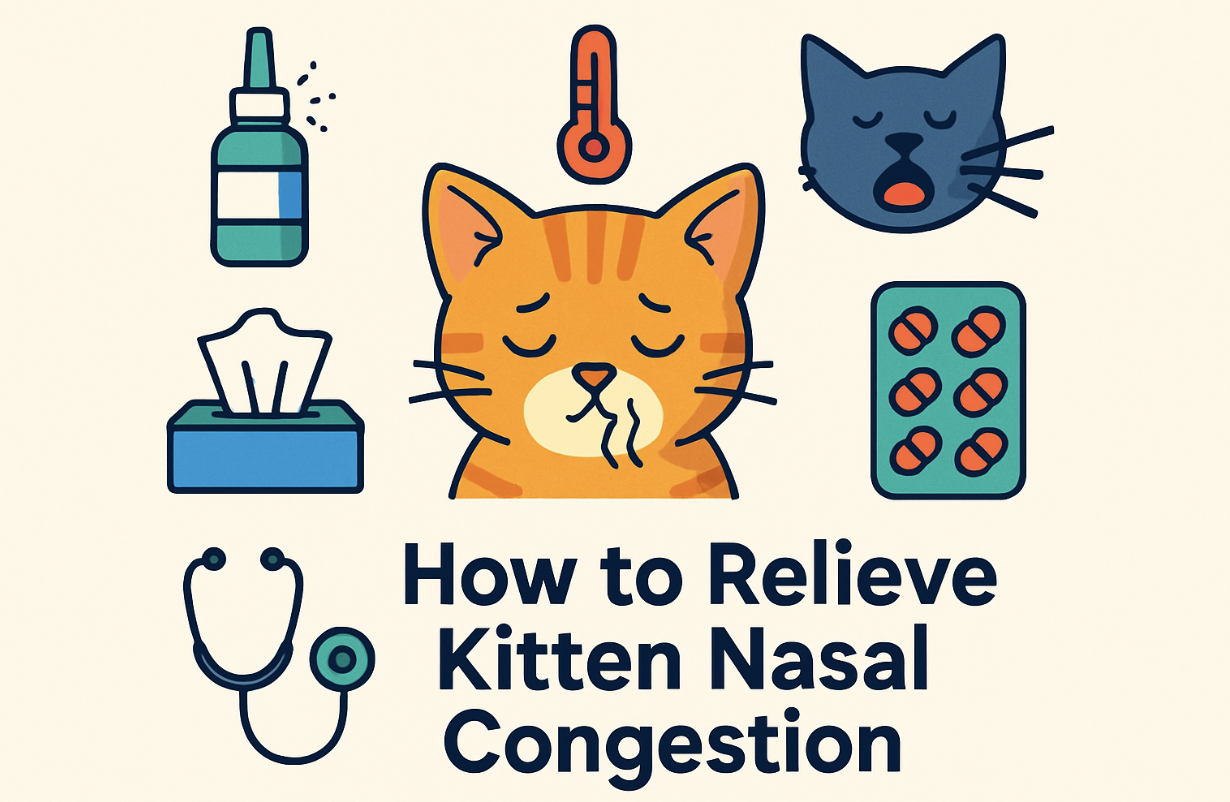
Nasal congestion in kittens can cause significant discomfort and even lead to serious health issues if left untreated. A stuffy nose may prevent your kitten from breathing easily, eating properly, or staying active. Fortunately, helping them relieve their stuffy nose doesn’t have to be complicated. Simple steps, such as maintaining a clean environment and using gentle home remedies, can make a significant difference in relieving their symptoms and improving their comfort.
How to Identify Nasal Congestion in Kittens
Recognizing nasal congestion in your kitten early can help you address the issue before it worsens. Understanding the signs and behaviors associated with a stuffy nose is essential for providing timely care.
Common Symptoms of a Stuffy Nose
Sneezing, nasal discharge, and noisy breathing
Frequent sneezing is one of the most noticeable signs of nasal congestion in kittens. It often occurs due to irritants or infections in their nasal passages. You may also observe nasal discharge, which can range from clear and watery to thick and yellowish, depending on the underlying cause. Noisy breathing, such as wheezing or snorting, is another indicator that your kitten might be struggling with a blocked nose.
These symptoms are often associated with conditions such as an upper respiratory infection, which is common in kittens due to their developing immune systems.
Reduced appetite or lethargy
A congested nose can make it difficult for your kitten to smell its food, leading to a reduced appetite. This lack of interest in eating can result in low energy levels and lethargy. If your kitten seems unusually tired or uninterested in activities it usually enjoys, nasal congestion might be the culprit.
Addressing these symptoms promptly is crucial, as prolonged loss of appetite can lead to dehydration and other health complications.
Behavioral Changes to Watch For
Excessive pawing at the nose
Kittens often use their paws to communicate discomfort. If your kitten frequently paws at its nose, it could be trying to relieve irritation caused by congestion. This behavior might also indicate the presence of a foreign object in the nasal passage, which requires immediate attention.
Avoiding play or interaction
Kittens are naturally curious and playful. A sudden disinterest in playing or interacting with you could signal that your kitten is feeling unwell. Nasal congestion can make breathing more difficult, leaving your kitten less inclined to engage in physical activities. This behavioral change, combined with other symptoms, should prompt you to take action to improve your kitten’s comfort.
What Causes Nasal Congestion in Kittens?
Understanding the causes of nasal congestion in kittens can help you take the right steps to address the issue. Several factors, ranging from infections to environmental conditions, can contribute to this problem.
Identifying these causes early ensures your kitten receives the care it needs.
Common Causes
Upper respiratory infections (viral or bacterial)
One of the most frequent causes of nasal congestion in kittens is an upper respiratory infection. These infections often result from viruses like feline herpesvirus or calicivirus, which are highly contagious among cats. Bacterial infections can also play a role, especially when secondary infections develop due to weakened immunity.
Kittens are particularly vulnerable because their immune systems are still developing.
Symptoms such as sneezing, nasal discharge, and noisy breathing often accompany these infections. If left untreated, a feline upper respiratory infection can lead to more severe complications, including pneumonia.
Allergies to dust, pollen, or other irritants
Kittens can develop allergies to common environmental allergens like dust, pollen, or mold. These allergens irritate the nasal passages, causing inflammation and congestion. Polysensitized kittens—those sensitive to multiple allergens—may experience more severe symptoms compared to those with a single allergy.
Regular cleaning of your kitten’s living space can help minimize exposure to these irritants and reduce the risk of allergic reactions.
Foreign objects in the nasal passage
Curious kittens often explore their surroundings by sniffing and pawing at objects. This behavior increases the likelihood of foreign objects, such as small pieces of debris or plant material, becoming lodged in their nasal passages.
When this happens, your kitten may exhibit symptoms like excessive sneezing or pawing at its nose. Immediate attention is necessary to prevent further discomfort or infection.
Environmental Factors
Dry air or poor ventilation
Dry air, especially during colder months when heating systems are in use, can dry out your kitten’s nasal passages. This dryness makes it harder for their nose to filter out irritants, leading to congestion. Poor ventilation in your home can also trap airborne particles, such as dust and pet dander, which may exacerbate nasal issues.
Using a humidifier and ensuring proper airflow in your kitten’s environment can alleviate these problems.
Exposure to smoke or strong odors
Kittens have sensitive respiratory systems that react strongly to irritants such as cigarette smoke, scented candles, or cleaning products containing harsh chemicals. Prolonged exposure to these substances can inflame their nasal passages, resulting in congestion.
Keeping your kitten away from areas where these irritants are present can significantly improve their respiratory health.
How to Help Your Kitten with a Stuffy Nose at Home
When your kitten experiences nasal congestion, simple home remedies can offer relief and enhance their comfort. Follow these steps to address mild symptoms and help your furry friend breathe easier.
Step-by-Step Instructions
Gently clean your kitten’s nose with a warm, damp cloth
Use a soft, damp cloth to wipe away any discharge around your kitten’s nose. This keeps the area clean and prevents further irritation. Be gentle to avoid causing discomfort. Regular cleaning also helps maintain hygiene and reduces the risk of infection.
Use a humidifier or steam from a hot shower to clear nasal passages
Set up a humidifier in the room where your kitten spends most of its time. Moist air soothes irritated nasal passages and helps loosen mucus. Alternatively, take your kitten into the bathroom while running a hot shower. The steam can work wonders in clearing congestion.
Ensure your kitten stays at a safe distance from the hot water.
Encourage hydration by offering fresh water or smelly wet food
Hydration plays a key role in thinning mucus and easing congestion. Provide fresh water throughout the day. If your kitten seems uninterested in drinking, offer smelly wet food to stimulate their appetite.
Foods with a strong aroma are easier for a congested kitten to detect and enjoy.
Use saline drops (one drop per nostril, two to three times daily)
Saline drops are safe and effective for relieving nasal congestion in kittens. Administer one drop per nostril, up to three times daily. This helps clear blockages and reduces irritation. Always use saline drops specifically designed for pets, and consult your veterinarian if you’re unsure about the product.
Create a warm, comfortable environment for your kitten
A cozy environment promotes faster recovery. Keep your kitten’s living space warm and free from drafts. Use soft bedding and ensure they have a quiet area to rest. Avoid exposing your kitten to strong odors or irritants, such as cleaning products or smoke, which can worsen their symptoms.
What You Need
To effectively care for your kitten at home, gather the following items:
-
Soft cloth or cotton balls: For cleaning your kitten’s nose gently.
-
A humidifier or access to a steamy bathroom: To provide moisture and clear nasal passages.
-
Saline drops: To relieve congestion safely.
-
Kitten-safe wet food: To encourage eating and maintain hydration.
Having these essentials on hand ensures you’re prepared to address your kitten’s needs promptly.
Who Should Try This?
These home remedies are ideal for:
-
Pet owners with kittens showing mild symptoms of nasal congestion: If your kitten has a stuffy nose but remains active and alert, these steps can help.
-
Those who want to try home remedies before seeking veterinary care: For mild cases, these methods often provide relief without the need for immediate medical intervention.
If symptoms persist or worsen, consult a veterinarian to rule out serious conditions.
Potential Challenges
Kittens may resist cleaning or humidifier use
Your kitten might not cooperate when you try to clean its nose or introduce a humidifier. Kittens often dislike having their faces touched, especially if they are already feeling unwell. To make the process smoother, approach your kitten calmly and gently. Use a soft cloth and warm water to clean its nose, ensuring minimal discomfort. When using a humidifier, place it in a quiet corner of the room where your kitten feels safe. Avoid forcing your kitten to stay near the humidifier.
Instead, let it explore the area at its own pace. Patience and a soothing tone can help reduce resistance.
Symptoms may persist despite home care
Even with consistent home remedies, your kitten’s symptoms might not improve. Persistent nasal congestion could indicate an underlying issue, such as a severe infection or an allergy that requires professional attention. If your kitten shows no signs of improvement after a few days of care, consult a veterinarian.
Early intervention can prevent complications and ensure your kitten receives the appropriate treatment. Remember, certain conditions, such as upper respiratory infections, may require medications like antibiotics or anti-inflammatory drugs to resolve fully.
Common Mistakes to Avoid
Using harsh or scented cleaning products
Harsh cleaning products or those with strong scents can irritate your kitten’s sensitive nasal passages. Avoid using household cleaners, scented wipes, or any product not specifically designed for pets. Stick to a soft cloth dampened with lukewarm water or saline solution to clean your kitten’s nose.
This gentle approach minimizes irritation and keeps your kitten comfortable. Always check product labels to ensure they are safe for kittens.
Ignoring signs of worsening symptoms
Overlooking signs of worsening symptoms can delay necessary medical care. Watch for red flags like high fever, refusal to eat, or labored breathing. These symptoms may indicate a more serious condition that requires immediate veterinary attention. Ignoring these signs can lead to complications, such as dehydration or secondary infections.
Stay vigilant and act promptly if your kitten’s condition deteriorates. Timely care can make a significant difference in your kitten’s recovery.
When to Seek Veterinary Care for Your Kitten
Sometimes, home remedies may not be enough to relieve your kitten’s nasal congestion. Recognizing when to seek professional help is crucial for ensuring your kitten’s health and comfort. Understanding the warning signs and knowing what to expect during a veterinary visit can help you act promptly.
Red Flags That Require Immediate Attention
Severe or prolonged nasal congestion
If your kitten’s nasal congestion persists for more than a few days or worsens despite home care, it may indicate a more serious issue. Prolonged congestion can interfere with breathing and lead to complications like secondary infections.
Acting quickly can prevent further discomfort and ensure your kitten receives the necessary treatment.
High fever, dehydration, or refusal to eat
A high fever often signals an underlying infection, such as an upper respiratory infection (URI). Dehydration can occur if your kitten refuses to eat or drink due to its inability to smell food. These symptoms require immediate attention, as they can weaken your kitten’s immune system and slow recovery. Offering smelly wet food or warming it slightly may encourage eating, but persistent refusal to eat should prompt a visit to the vet.
Signs of pain or distress
Watch for signs like labored breathing, excessive crying, or unusual lethargy. These behaviors may indicate that your kitten is in pain or experiencing significant discomfort. Pain or distress often accompanies severe cases of URI or other respiratory issues. Seeking veterinary care ensures your kitten gets relief and avoids further complications.
Caring for your kitten’s health starts with recognizing the signs of nasal congestion and understanding its causes. Simple home remedies, like using a humidifier or saline drops, can provide relief and improve their comfort. Knowing when to seek veterinary care ensures your kitten receives timely treatment for conditions like an upper respiratory infection.
Preventive measures, such as maintaining a clean environment and supporting their immune system, help reduce future risks. Act promptly to address symptoms and create a nurturing space for recovery.
With proper care, your kitten can breathe easier and return to their playful self in no time.

In her previous life, Lisa traveled extensively, both for work and leisure. After the pandemic struck, Lisa locked up her luggage and adopted a cat ever since.
Lisa is now an avid cat lover, she devotes most of her free time serving as butler to her adorable feline at home. When she is not with her cat, she can be seen using her phone sourcing for the latest cat supplies online.


